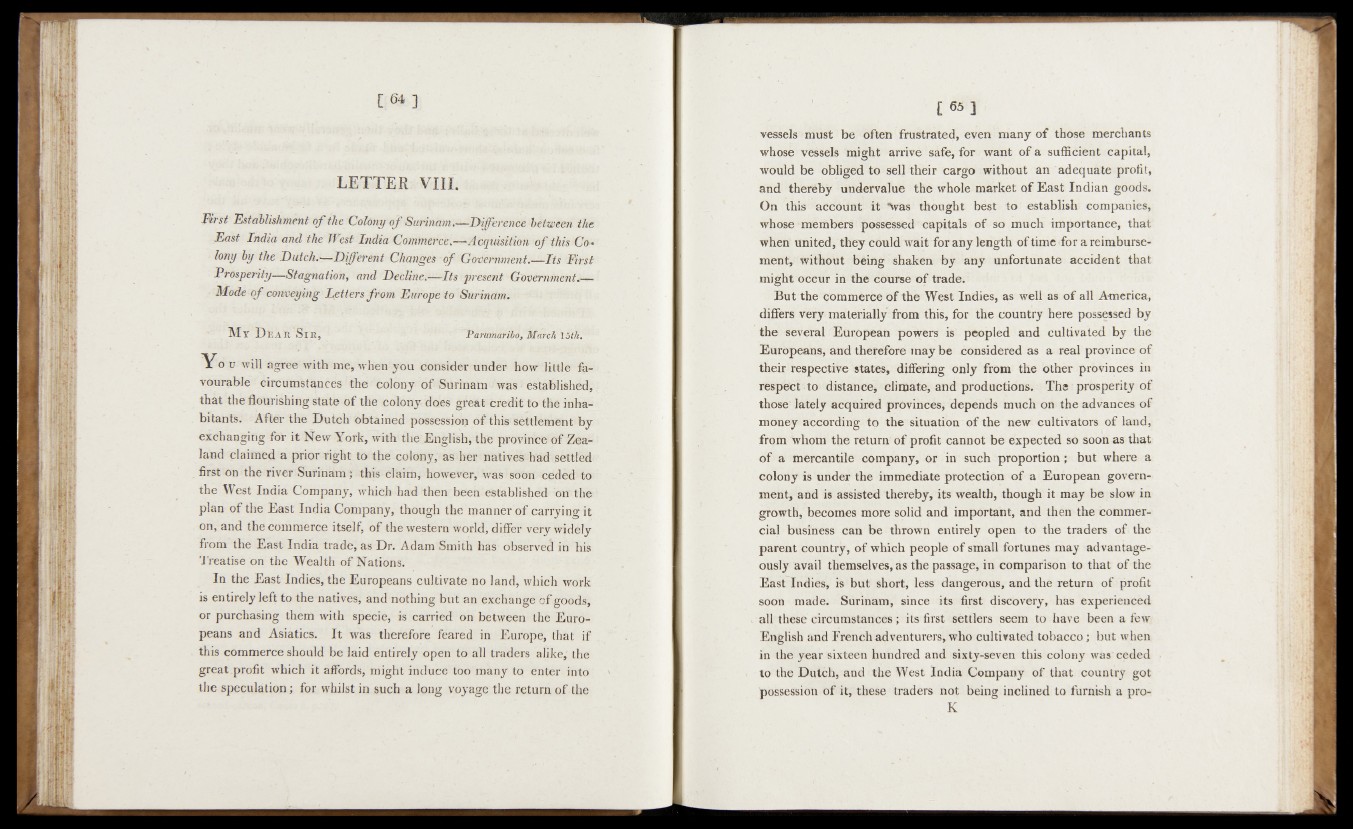
L E T T E R V I I I .
First Establishment o f the Colony o f Surinam.—Difference between the
E a st India and the West India Commerce.— Acquisition o f this Co*
lony by the Dutch.-—Different C han ges-(f Government.— I ts Fh:st
Prosperity-—Stagnation, and Decline.*—I ts present Government.—
Mode o f conveying l e t t e r s from Europe to Surinam.
My D ear Sir , Paramaribo,
Y o u will agree with mé, when you consider under how little favourable
circumstances the colony of Surinam was established,
that the flourishing state of the colony doés great credit to the inhabitants.
After the Dutch obtained possession of this 'settlement by
exchanging for it New York, with the English, the provinceafZea-
lahd claimed a prior right to the colony, as her natives had settled
first on the river Surinam; this claim, however, was söOn'cedèdJto
the West India Company, which had then been established the
plan of the East India Company, though the manner of carrying it
on, and the commerce itself, of the western world, differ very widely
from the East India trade, as Dr. Adam Smith has observed in his
Treatise on the Wealth of Nations.
In the East Indies, the Europeans cultivate no land, which work
is entirely left to the natives, and nothing but an exchange ofgoods,
or purchasing them with specie, is carried on between the Europeans
and Asiatics. It was therefore; féared in Europe, that if
this commerce should be laid entirely open to all traders alike; the
great,profit which it affords, might induce too many to entér into
the speculation; for whilst in such a long voyage the return of the
vessels must be often frustrated, even many of those merchants
whose vessels might arrive safe, for want of a sufficient capital,
would be obliged to sell their cargo without an adequate profit,
and thereby undervalue the whole market of East Indian goods.
On this account it Vas thought best to establish companies,
whose'members possessed capitals of so much importance, that
when united, they could wait for any length of time for a reimbursement,
without being shaken by any unfortunate accident that
might occur in the course of trade.
But the commerce of the West Indies, as well as of all America,
differs very materially from this, for the country here possessed by
the several European powers is peopled and cultivated by the
Europeans, and therefore maybe considered as a real province of
their respective states, differing only from the other provinces in
respect to distance, climate, and productions. The prosperity of
those lately acquired provinces, depends much on the advances of
money according to the situation of the new cultivators of land,
from whom the return Of profit cannot be expected so soon as that
of a mercantile company, or in such proportion; but where a
colony is under the immediate protection of a European government,
and is assisted thereby, its wealth, though it may be slow in
growth, becomes more solid and important, and then the commercial
business can be thrown entirely open to the traders of the
parent country, of which people of small fortunes may advantageously
avail themselves, as the passage, in comparison to that of the
East Indies, is but short, less dangerous, and the return of profit
soon made. Surinam, since its first discovery, has experienced
all these circumstances; its first settlers seem to have been a few
English and French adventurers, who cultivated tobacco; but when
in the year sixteen hundred and sixty-seven this colony was ceded
to the Dutch, and the West India Company of that country got
possession of it, these traders not being inclined to furnish a pro-
K